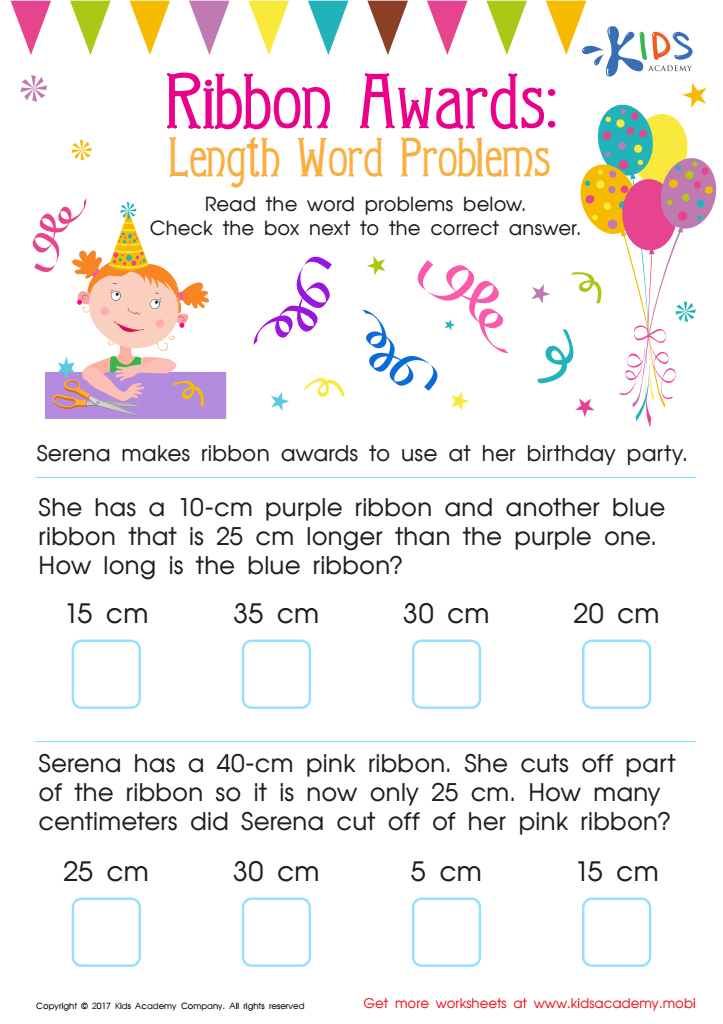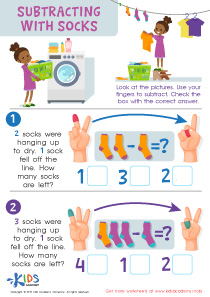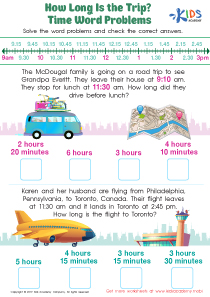Length and Mass Word Problems Worksheets for Ages 3-4
1 filtered results
-
From - To
Introducing our captivating Length and Mass Word Problems worksheets, expertly designed for children aged 3-4 years. These Homeschool homework sheets offer a delightful mix of fun and learning, tailored to develop early mathematical skills through engaging word problems. Each worksheet focuses on fundamental concepts of length and mass, encouraging young learners to explore and understand measurements in a practical context. Perfect for homeschool settings, these sheets ensure a solid foundation in math with colorful, child-friendly graphics that capture little imaginations. Help your little ones build confidence and enjoy their learning journey with our thoughtfully crafted educational resources.


Length Word Problems Worksheet
The Importance of Learning Worksheets on Length and Mass Word Problems for Young Children
In the early years of childhood education, learning worksheets are designed to introduce and reinforce key concepts that form the foundation of a child’s academic and practical skills. Specifically, worksheets focused on length and mass word problems are incredibly beneficial for children aged 3-4 years. These resources are not just tools for learning; they are stepping stones that help young learners understand the world around them through quantification and comparison.
Learning worksheets on length and mass word problems are essential because they integrate basic mathematical concepts with everyday life experiences. At ages 3-4, children are naturally curious about the environment around them. They often explore, ask questions, and make observations. By engaging with these worksheets, children learn to apply mathematical terms and ideas to describe and relate to their surroundings effectively.
Development of Numeracy Skills One of the primary advantages of these worksheets is the development of early numeracy skills. Length and mass are fundamental aspects of measurement, a key area of early math education. Through age-appropriate word problems, children learn to understand and use units of measurement such as inches, feet, grams, and kilograms, albeit in a very introductory form. This not only enhances their ability to perform basic calculations but also improves their ability to think logically and solve problems.
Enhancing Language and Reading Comprehension While primarily focused on math, learning worksheets on length and mass also significantly contribute to language development. As young children decode the information presented in word problems, they develop reading comprehension skills. They learn new vocabulary and conceptually connect words to corresponding physical properties. This intersection of math and language enriches their cognitive abilities and cross-disciplinary understanding.
Building Confidence and Independence Engagement with learning worksheets helps boost confidence among young learners. As they solve problems about length and mass, children experience a sense of achievement which fosters greater educational engagement and confidence. Moreover, these activities teach children to work independently, a crucial skill for school readiness. As they follow instructions, interpret problems, and jot down their answers, they learn to trust their reasoning and capabilities.
Interactive and Fun Learning To cater to the young age range, learning worksheets on length and mass are often designed with colorful illustrations and engaging themes that involve characters and stories relatable to a preschooler. This makes learning not just educational but also fun. By transforming abstract concepts into visually appealing and interactive content, children are more likely to engage deeply with the material and retain the information they learn. Interactive worksheets can transform a mundane topic like measurement into an exciting adventure, where solving a problem feels like helping a favorite cartoon character.
Preparation for Advanced Topics While they might seem simple, learning worksheets on length and mass lay an essential groundwork for more advanced mathematical and scientific concepts. Early exposure to these topics prepares children for future educational challenges by building a strong foundational knowledge. As they progress in their schooling, this early introduction to measurement through word problems will make the transition to more complex math much smoother.
Parent and Teacher Insights Furthermore, these worksheets provide valuable insights to parents and educators about the developmental progress of the child. Observing how a child interacts with the worksheets can help adults identify areas where the child excels or needs more support. This can guide personalized teaching approaches and targeted interventions, ensuring that each child’s educational journey is as effective and fulfilling as possible.
Encouraging Curiosity and Exploration Finally, learning worksheets on length and mass encourage a spirit of curiosity and exploration. They prompt young learners to question how and why things work. For instance, a worksheet might ask a child to compare the weights of different objects or to measure items around the house. These activities make learning an active, hands-on experience that stimulates curiosity and encourages children to explore more about their physical world.
In conclusion, learning worksheets on length and mass word problems are more than just educational tools; they are integral to developing a young child’s mathematical, linguistic, and cognitive skills. By presenting math in an engaging and accessible manner, these worksheets not only teach important concepts but also foster a lifelong love of learning. For children aged 3-4 years, they offer a fun and foundational step into the world of math and measurement, setting the stage for future academic success and a deeper understanding of the world.
 Assign to My Students
Assign to My Students








